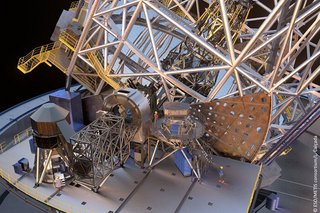Recently, an important milestone was achieved for one of the first high-tech instruments of the ELT, the largest optical and infrared telescope in the world currently under construction: The METIS instrument has become the first ELT instrument to pass its Final Design Review (FDR), marking an important step for the project. The Extremely Large Telescope (ELT) of the European Southern Observatory (ESO) is currently under construction on Cerro Armazones in the Chilean Coast Range at an altitude of 3,046 metres. It will look into the universe for the first time towards the end of this decade. To reach this important goal, the new cameras and spectrometers must also be ready to use together with the gigantic 39m mirror of the ELT. Only with such instruments will it be possible to analyse the faint light collected by the ELT from distant planets, stars and galaxies, and deliver new science from unique images and spectra.
One of the first-light instruments will be the Mid-infrared ELT Imager and Spectrograph, or METIS. The instrument will not only be able to record diffraction-limited and high-contrast images, it will also be used in various spectroscopic modes. Depending on the operating mode, this is achieved at mid-infrared wavelengths between three and thirteen micrometres. Among other things, this will allow exoplanets and their natal planet-forming discs around young stars to be studied with unprecedented details. “Our understanding of many of the most important astrophysical questions concerning the formation of galaxies or the evolution of young extrasolar systems will be greatly improved”, said Professor Dr. Lucas Labadie, the METIS co-investigator at the University of Cologne's Institute for Astrophysics.
The development and construction of sophisticated instruments such as METIS takes many years. Now the final overall design of the instrument has been fully approved in every detail and all components can be manufactured and assembled. The actual FDR review took place in November 2022, but it took some longer time to obtain the formal approval from ESO. The team in Cologne led by Labadie contributed to the METIS instrument with the development of the Warm Calibration Unit (WCU) sub-system. This sub-system provides the tools to verify and calibrate the METIS instrument during the integration phase and during its scientific life in Chile. The sub-system is currently under construction in the integration hall in the newly opened physics lab building and will be tested to verify all its functionalities. The WCU will then be packed and shipped to Leiden in the Netherlands for the final integration with the other sub-systems of METIS.
After successful PAE (the “Preliminary Acceptance Europe”) in July 2028, the transportation to Chile will take place. Following installation at the ELT on Cerro Armazones, the so-called “First Light” is expected in 2029, when the instrument will capture starlight for the first time.
The METIS consortium consists of NOVA (Netherlands Research School for Astronomy represented by the University of Leiden, The Netherlands), the Max Planck Institute for Astronomy (MPIA, Heidelberg, Germany), the University of Cologne (Germany), the UK Astronomy Technology Centre (UKATC, Edinburgh, Scotland, UK), KU Leuven (Belgium), the Paris Saclay research center of the CEA (French Alternative Energies and Atomic Energy Commission, France), the Center for Astrophysics and Gravitation (CENTRA, University of Lisbon, Portugal), ETH Zürich (Switzerland), A* (an Austrian partnership represented by the Universities of Vienna, Innsbruck, Graz, Linz, and RICAM Linz, the Austrian Academy of Sciences, Austria), the University of Michigan at Ann Arbor (United States), Academia Sinica Institute of Astronomy and Astrophysics, Taipei (Taiwan), and the Université de Liège (Belgium), with contributions from ESO.
Media Contact:
Professor Dr. Lucas Labadie
Institute for Astrophysics
+49 221 470 3493
labadieph1.uni-koeln.de
Press and Communications Team:
Jan Voelkel
+49 221 470 2356
j.voelkelverw.uni-koeln.de
Further Information:
https://www.eso.org/public/announcements/ann24007/
